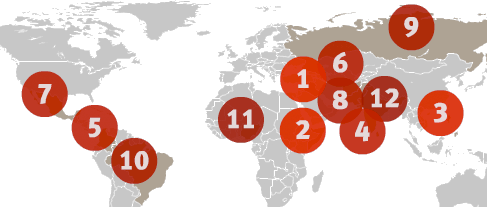Brazil played an increasingly dominant role in the international arena, but its record on press freedom at home continued to disappoint free-expression advocates. As the deadly violence that surged over the past three years continued, three journalists were murdered in direct retaliation for their work in 2013. Brazil’s ranking worsened on CPJ’s Impunity Index, which highlights countries where journalists are killed regularly and authorities fail to solve the crimes. In positive developments, authorities achieved convictions for three murders of journalists. The gunmen in the 2010 murder of radio journalist and blogger Francisco Gomes de Medeiros and the 2011 murder of journalist Edinaldo Filgueira were convicted and sentenced to prison. In a rare example of full justice, all of the perpetrators, including the mastermind, were brought to justice in the 2002 murder of newspaper publisher Domingos Sávio Brandão Lima. Reporters faced attacks and threats, and, in one case, had to flee the country temporarily, while others were arrested and targeted during anti-government protests that swept the country in the second half of the year. President Dilma Rousseff made international headlines after information leaked by former U.S. National Security Agency contractor Edward Snowden revealed that Brazilian electronic communications had been intercepted by the NSA. She responded by calling for a bill to regulate the country’s Internet use in a way that would make it less vulnerable to spying, a move that, if implemented, could have widespread consequences for the global infrastructure of the Internet. Internet companies continued to receive numerous requests from Brazilian courts to remove content, as the media faced judicial censorship and hefty fines in defamation suits. After being initially silent on the issue, Brazil supported and defended the Inter-American Human Rights System from an attack led by a bloc of countries that sought to neutralize its work.
Brazil
» Despite convictions in past cases, deadly violence continues.
» Journalists attacked, arrested amid widespread protests.
Brazil played an increasingly dominant role in the international arena, but its record on press freedom at home continued to disappoint free-expression advocates. As the deadly violence that surged over the past three years continued, three journalists were murdered in direct retaliation for their work in 2013. Brazil’s ranking worsened on CPJ’s Impunity Index, which highlights countries where journalists are killed regularly and authorities fail to solve the crimes. In positive developments, authorities achieved convictions for three murders of journalists. The gunmen in the 2010 murder of radio journalist and blogger Francisco Gomes de Medeiros and the 2011 murder of journalist Edinaldo Filgueira were convicted and sentenced to prison. In a rare example of full justice, all of the perpetrators, including the mastermind, were brought to justice in the 2002 murder of newspaper publisher Domingos Sávio Brandão Lima. Reporters faced attacks and threats, and, in one case, had to flee the country temporarily, while others were arrested and targeted during anti-government protests that swept the country in the second half of the year. President Dilma Rousseff made international headlines after information leaked by former U.S. National Security Agency contractor Edward Snowden revealed that Brazilian electronic communications had been intercepted by the NSA. She responded by calling for a bill to regulate the country’s Internet use in a way that would make it less vulnerable to spying, a move that, if implemented, could have widespread consequences for the global infrastructure of the Internet. Internet companies continued to receive numerous requests from Brazilian courts to remove content, as the media faced judicial censorship and hefty fines in defamation suits. After being initially silent on the issue, Brazil supported and defended the Inter-American Human Rights System from an attack led by a bloc of countries that sought to neutralize its work.
Three journalists were killed in Brazil in direct retaliation for their reporting. A fourth journalist was killed under unclear circumstances. CPJ continues to investigate the case.
With eight unsolved murders over the past decade, Brazil ranked 10th on CPJ's Impunity Index. Brazil's impunity rating has risen in recent years. In 2012, the country ranked 11th on CPJ's Impunity Index.

| 1. Iraq 2. Somalia 3. Philippines | 4. Sri Lanka 5. Colombia 6. Afghanistan | 7. Mexico 8. Pakistan 9. Russia | 10. Brazil 11. Nigeria 12. India |
The Brazilian Association of Investigative Journalism (ABRAJI) reported in late October 2013 that at least 98 attacks had occurred on journalists covering protests that spread throughout the country beginning in June. The abuses included attacks with rubber bullets, batons, pepper and tear gas, vinegar, and rocks; beatings, intimidation, and destruction of property; obstruction of coverage; and short-term detentions.
Attacks on journalists originated mostly with law enforcement, according to ABRAJI. But protesters also targeted journalists or media outlets, saying they disliked coverage of the demonstrations.
2 | Journalists hospitalized for eye injuries caused by rubber bullets |
8 | Journalists detained, one for as long as two days |
25 | Violations committed by protesters |
73 | Violations committed by law enforcement or security officers |
In the first half of 2013, Brazilian courts issued at least nine judicial takedown orders to Twitter, more than any other country in the world, according to Twitter's mid-2013 Transparency Report. The report said that at least one request to remove content had also been filed by a government agency or law enforcement.
The company said that it had at least partially complied in at least 20 percent of the cases.
9 | Brazil |
3 | Turkey |
2 | United States |
1 | Canada |
1 | Germany |
1 | India |
1 | Indonesia |
1 | Japan |
1 | United Kingdom |
1 | Venezuela |
